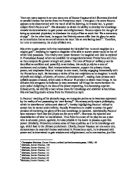In Faustus’ reaching of his pinnacle stage, we recognise pathos as he becomes oppressed by the reality of not possessing his ‘own fantasy’. He consequently rejects philosophy, which he describes as ‘odious and obscure’; thereby highlighting Faustus’ refusal to accept that he cannot attain infinity. Equally Prometheus is unable to accept the gods’ demand of restricting the glory of fire and knowledge to mankind. Additionally, Faustus’ later statement ‘both law and physic are for petty wits’, illustrates his rejection and dissatisfaction of what he has obtained. Thus from the outset of the play we see a man who is educated, proud, egotistic, but also pitiable in his desire to possess a god-like power. Similarly, Prometheus shares some of these qualities, as it is his knowledge and ego, which lead to his ultimate punishment. Clearly, Doctor Faustus, act one scene one, demonstrates the essential themes maintained in Prometheus myth, he is obsessed with power and is determined to gain wisdom and enlightenment, as he overreaches, just like Prometheus. Consequently, our central characters both share comparable weaknesses, which we discover through their pride and ego.
Moreover, fate is another crucial factor explored in Greek tragedies. The Prometheus myth offers one extended Scene of Suffering, which is apparent as Prometheus is literally chained by his fate. Similarly, this is explored in Doctor Faustus as Marlowe presents the struggle with religion throughout, which inevitably leads to his ultimate deterioration and damnation by his descending to hell. Faustus’ speech offers a tone of helplessness and sourness as he quotes from Romans 6.23, ‘the reward of sin is death. That’s hard’, this develops the idea of the lack of control one has over life. Furthermore, his biblical quotes are followed by his Latin interpretation ‘che sera, sera’ drawing attention and emphasis to the Protestantism belief of predestination, allowing the audience to relate or understand Faustus’ struggle within his religion and individuality. This also serves in the theme of fate, as Faustus is prohibited control over his life and destiny, he may be damned whether or not he engages with the ‘necromantic books’, hence Marlowe translates: ‘what will be, shall be?’ focusing on a crucial and significant part of the play. This is also reinforced in the Prometheus myth as Prometheus already has knowledge of his punishment and sufferings, which adds to the tragedy, as there is a sense of inevitability. Thus, both characters are unable to control their destiny regardless of the knowledge or wisdom they embody.
The agony expressed by both characters is to some degree hyperbolised by the grotesque images and intense pain. However, it is the suffering, which stresses the direct links between Doctor Faustus and the Prometheus myth. The excruciating pain maintained by Prometheus, exposes the theme of suffering. Though it is not until act five, scene two, where we establish the deep distress and anguish experienced by Faustus, act one, scene one, also offers a struggle within Faustus’ identity as he battles with his individuality and beliefs. The illustration of the good and evil angels may be a personification of the conflict and choices that continue to face Faustus. Their opposing views represent Faustus’ confusion, and in turn highlight his suffering within the opening of the play. Hence, it is evident that the text engages with the Prometheus myth as it demonstrates aspects of torture and damnation, which are apparent in Prometheus bound.
In conclusion, although Doctor Faustus contains a different setting and a contrasting society from what we are familiar with in Prometheus myth, we can still discern similarities as well as conflicts between the Christian worldviews and the Greek or renaissance worldviews, which becomes explicit by the identical themes between them. The reference to Icarus foreshadows Faustus’ fate as he endeavours to gain knowledge, his overreaching desire parallels the Prometheus myth, hence, it is no surprise to find that Prometheus’ suffering is re-established in Faustus’ struggle. Moreover, the texts continue to engage thematically as we identify power, pride, and rebellion, in which our protagonists face.
Word count: 1059
Bibliography:
-
.
-
.
-
.
-
.
-
.
-
Christopher Marlowe, Doctor Faustus, oxford: (oxford university press, 1998).
Christopher Marlowe, Doctor Faustus, oxford: (oxford university press, 1998), 140
Marlowe, Doctor Faustus, 140
Marlowe, Doctor Faustus, 141
Marlowe, Doctor Faustus, 141
Marlowe, Doctor Faustus, 141
Marlowe, Doctor Faustus,142
Marlowe, Doctor Faustus,142
Marlowe, Doctor Faustus, 142
Marlowe, Doctor Faustus, 141
Marlowe, Doctor Faustus, 141
Marlowe, Doctor Faustus, 141
Marlowe, Doctor Faustus, 141







